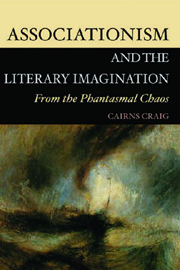Book contents
- Frontmatter
- Contents
- Acknowledgments
- Abbreviations
- Introduction: A Chain of Associations
- 1 ‘Kant has not answered Hume’: Hume, Coleridge and the Romantic Imagination
- 2 Signs of Mind and the Return of the Native: Wordsworth to Yeats
- 3 Strange Attractors and the Conversible World: Hume, Sterne, Dickens
- 4 The Mythic Method and the Foundations of Modern Literary Criticism
- 5 Chaos and Conversation: Pater, Joyce, Woolf
- 6 The Lyrical Epic and the Singularity of Literature
- Bibliography
- Index
Introduction: A Chain of Associations
Published online by Cambridge University Press: 12 September 2012
- Frontmatter
- Contents
- Acknowledgments
- Abbreviations
- Introduction: A Chain of Associations
- 1 ‘Kant has not answered Hume’: Hume, Coleridge and the Romantic Imagination
- 2 Signs of Mind and the Return of the Native: Wordsworth to Yeats
- 3 Strange Attractors and the Conversible World: Hume, Sterne, Dickens
- 4 The Mythic Method and the Foundations of Modern Literary Criticism
- 5 Chaos and Conversation: Pater, Joyce, Woolf
- 6 The Lyrical Epic and the Singularity of Literature
- Bibliography
- Index
Summary
In his Autobiography John Stuart Mill recounts how, in the autumn of 1826, at the age of twenty, he suffered the onset of a depression – ‘a dull state of nerves … unsusceptible to enjoyment or pleasurable excitement’ – which was to continue during the following two years. Thirty years later Mill thought that ‘in all probability my case was by no means so peculiar as I fancied it’ but the ‘idiosyncracies of my education had given to the general phenomenon a special character, which made it seem the natural effect of causes that it was hardly possible for time to remove’ (Au, 145). Those ‘idiosyncracies’ derived from the theories of his father, James Mill, Scottish psychologist and proponent of the Utilitarian social philosophy of Jeremy Bentham: the elder Mill undertook the education of his son himself, determined to prove that a child could acquire ‘an amount of knowledge in what are considered the higher branches of education, which is seldom acquired (if acquired at all) until the age of manhood’ (Au, 33). The younger Mill's prodigious knowledge of classics and of political economy when only in his teens was apparent testimony to the benefits of his father's educational practices, giving him what he himself described as the ‘advantage of a quarter of a century over my contemporaries’ – despite the fact that he rated himself in ‘natural gifts’ as ‘rather below than above par’ (Au, 33).
- Type
- Chapter
- Information
- Associationism and the Literary ImaginationFrom the Phantasmal Chaos, pp. 1 - 40Publisher: Edinburgh University PressPrint publication year: 2007



